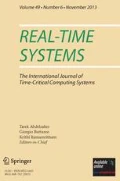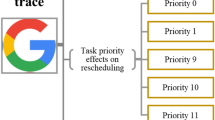Abstract
Contemporary multiprocessor real-time operating systems, such as VxWorks, LynxOS, QNX, and real-time variants of Linux, allow a process to have an arbitrary processor affinity, that is, a process may be pinned to an arbitrary subset of the processors in the system. Placing such a hard constraint on process migrations can help to improve cache performance of specific multi-threaded applications, achieve isolation among applications, and aid in load-balancing. However, to date, the lack of schedulability analysis for such systems prevents the use of arbitrary processor affinities in predictable hard real-time systems. This paper presents the first analysis of multiprocessor scheduling with arbitrary processor affinities from a real-time systems perspective. It is shown that job-level fixed-priority scheduling with arbitrary processor affinities is strictly more general than global, clustered, and partitioned job-level fixed-priority scheduling combined. Concerning the more general case of job-level dynamic priorities, it is shown that global and clustered scheduling are equivalent to multiprocessor real-time scheduling with arbitrary processor affinities. The Linux push and pull scheduler is studied as a reference implementation and two approaches for the schedulability analysis of hard real-time tasks with arbitrary processor affinities are presented. In the first approach, the scheduling problem is reduced to “global-like” sub-problems to which existing global schedulability tests can be applied. The second approach is specifically based on response-time analysis and models the response-time computation as a linear optimization problem. The latter linear-programming-based approach has better runtime complexity than the former reduction-based approach. Schedulability experiments show the proposed techniques to be effective.







Similar content being viewed by others
References
Alfieri RA (1998) Apparatus and method for improved CPU affinity in a multiprocessor system. US Patent 5,745,778.
Anderson JH, Bud V, Devi UC (2005) An EDF-based scheduling algorithm for multiprocessor soft real-time systems. In: Proceedings of the 17th Euromicro conference on real-time systems, ECRTS’05, pp 199–208
Andersson B, Jonsson J (2000) Some insights on fixed-priority preemptive non-partitioned multiprocessor scheduling. In: Proceedings of the work-in-progress session of the 21st IEEE real-time systems symposium, RTSS’00
Andersson B, Raravi G, Bletsas K (2010) Assigning real-time tasks on heterogeneous multiprocessors with two unrelated types of processors. In: Proceedings of the 31st IEEE real-time systems symposium, RTSS’10, pp 239–248
Audsley NC, Burns A, Richardson MF, Wellings AJ (1991) Hard real-time scheduling: the deadline-monotonic approach. In: Proceedings of the 1991 IEEE workshop on real-time operating systems and software, pp. 133–137
Audsley NC, Burns A, Richardson MF, Tindell K, Wellings AJ (1993) Applying new scheduling theory to static priority pre-emptive scheduling. Soft Eng J 8(5):284–292
Bado B, George L, Courbin P, Goossens J (2012) A semi-partitioned approach for parallel real-time scheduling. In: Proceedings of the 20th international conference on real-time and network systems, RTNS’12, pp. 151–160
Baker TP, Baruah SK (2007) Schedulability analysis of multiprocessor sporadic task systems. In: Handbook of realtime and embedded systems, CRC Press, New York
Baruah SK (2004) Partitioning real-time tasks among heterogeneous multiprocessors. In: Proceddings of the international conference on parallel processing, ICPP’04, pp. 467–474
Baruah SK (2007) Techniques for multiprocessor global schedulability analysis. In: Proceedings of the 28th IEEE real-time systems symposium, RTSS’07, pp. 119–128
Baruah SK, Bini E (2008) Partitioned scheduling of sporadic task systems: an ILP-based approach. In: DASIP’08 Conference on design and architectures for signal and image processing, Bruxelles
Baruah SK, Brandenburg BB (2013) Multiprocessor feasibility analysis of recurrent task systems with specified processor affinities. In: RTSS’13, Proceedings of the 34th IEEE real-time systems symposium, pp. 160–169
Baruah SK, Cohen NK, Plaxton CG, Varvel DA (1996) Proportionate progress: a notion of fairness in resource allocation. Algorithmica 15:600–625
Bastoni A, Brandenburg BB, Anderson JH (2011) Is semi-partitioned scheduling practical? In: ECRTS’11, Proceedings of the 23rd Euromicro conference on real-time systems, pp. 125–135
Bertogna M, Cirinei M (2007) Response-time analysis for globally scheduled symmetric multiprocessor platforms. In: RTSS’07, Proceedings of the 28th IEEE real-time systems symposium, pp. 149–160
Brandenburg BB (2011) Scheduling and locking in multiprocessor real-time operating systems. PhD thesis, University of North Carolina, Carolina
Burns A, Davis RI, Wang P, Zhang F (2012) Partitioned EDF scheduling for multiprocessors using a C=D task splitting scheme. Real-Time Syst 48:3–33
Calandrino JM, Anderson JH, Baumberger DP (2007) A hybrid real-time scheduling approach for large-scale multicore platforms. In: ECRTS’07, Proceedings of the 19th Euromicro conference on real-time systems, pp. 247–258
Davis RI, Burns A (2011a) Improved priority assignment for global fixed priority pre-emptive scheduling in multiprocessor real-time systems. Real-Time Syst 47(1):1–40
Davis RI, Burns A (2011b) A survey of hard real-time scheduling for multiprocessor systems. ACM Comput Surv 43(4):35:1–35:44
Dertouzos ML, Mok AK (1989) Multiprocessor online scheduling of hard-real-time tasks. IEEE Trans Soft Eng 15(12):1497–1506
Dorin F, Yomsi PM, Goossens J, Richard P (2010) Semi-partitioned hard real-time scheduling with restricted migrations upon identical multiprocessor platforms. CoRR abs/1006.2637
Easwaran A, Shin I, Lee I (2009) Optimal virtual cluster-based multiprocessor scheduling. Real-Time Syst 43(1):25–59
Eisenbrand F, Rothvoß T (2008) Static-priority real-time scheduling: Response time computation is NP-hard. In: RTSS’08, Proceedings of the 29th IEEE real-time systems symposium, pp. 397–406
Eisenbrand F, Rothvoß T (2010) EDF-schedulability of synchronous periodic task systems is coNP-hard. In: Proceedings of the 21st annual ACM-SIAM symposium on discrete algorithms, pp. 1029–1034
Emberson P, Stafford R, Davis RI (2010) Techniques for the synthesis of multiprocessor tasksets. In: Proceedings of the 1st International Workshop on Analysis Tools and Methodologies for Embedded and Real-time Systems, WATERS’10, pp 6–11.
Fisher N, Goossens J, Baruah SK (2010) Optimal online multiprocessor scheduling of sporadic real-time tasks is impossible. Real-Time Systems 45(1–2):26–71
Foong A, Fung J, Newell D (2004) An in-depth analysis of the impact of processor affinity on network performance. In: Proceedings of the 12th IEEE International Conference on Networks, ICON’04, pp 244–250.
Foong A, Fung J, Newell D, Abraham S, Irelan P, Lopez-Estrada A (2005) Architectural characterization of processor affinity in network processing. In: Proceedings of the 2005 IEEE International Symposium on Performance Analysis of Systems and Software, pp 207–218.
Funk SH (2004) EDF scheduling on heterogeneous multiprocessors. PhD thesis, The University of North Carolina at Chapel Hill.
Gálvez JJ, Ruiz PM, Skarmeta AFG (2010) Heuristics for scheduling on restricted identical machines. University of Murcia, Spain, Tech. rep.
Guan N, Stigge M, Yi W, Yu G (2009) New response time bounds for fixed priority multiprocessor scheduling. In: Proceedings of the 30th IEEE Real-Time Systems Symposium, RTSS’09, pp 387–397.
Gujarati A, Cerqueira F, Brandenburg BB (2013) Schedulability analysis of the linux push and pull scheduler with arbitrary processor affinities. In: Proceedings of the 25th Euromicro Conference on Real-Time Systems, ECRTS’13, pp 69–79.
Harbour M, Palencia JC (2003) Response time analysis for tasks scheduled under EDF within fixed priorities. In: Proceedings of the 24th IEEE Real-Time Systems Symposium, RTSS’03, pp 200–209.
Jang HC, Jin HW (2009) MiAMI: Multi-core aware processor affinity for TCP/IP over multiple network interfaces. In: Proceedings of the 17th IEEE Symposium on High Performance Interconnects, HOTI’13, pp 73–82.
Joseph M, Pandya P (1986) Finding response times in a real-time system. The Computer Journal 29(5):390–395
Kato S, Yamasaki N, Ishikawa Y (2009) Semi-partitioned scheduling of sporadic task systems on multiprocessors. In: Proceedings of the 21st Euromicro Conference on Real-Time Systems, ECRTS’09, pp 249–258.
Lelli J, Lipari G, Faggioli D, Cucinotta T (2011) An efficient and scalable implementation of global EDF in Linux. In: Proceedings of the 7th International Workshop on Operating Systems Platforms for Embedded Real-Time Applications, OSPERT’11, pp 6–15.
Leung JYT, Li CL (2008) Scheduling with processing set restrictions: A survey. International Journal of Production Economics 116(2):251–262
Leung JYT, Whitehead J (1982) On the complexity of fixed-priority scheduling of periodic, real-time tasks. Performance evaluation 2(4):237–250
Lisper B, Mellgren P (2001) Response-time calculation and priority assignment with integer programming methods. In: Proceedings of the Work-in-Progress and Industrial Sessions of the 13th Euromicro Conference on Real-Time Systems, ECRTS’01.
Liu CL, Layland JW (1973) Scheduling algorithms for multiprogramming in a hard-real-time environment. Journal of the ACM 20(1):46–61
Lundberg L (1998) Multiprocessor scheduling of age constraint processes. In: Proceedings of the 5th International Conference on Real-Time Computing Systems and Applications, RTCSA’98, pp 42–47.
Markatos E, LeBlanc T (1992) Using processor affinity in loop scheduling on shared-memory multiprocessors. In: Proceedings of Supercomputing’92, pp 104–113.
Mok AK (1983) Fundamental design problems of distributed systems for the hard-real-time environment. Tech. rep, Massachusetts Institute of Technology
Palencia J, Harbour MG (2005) Response time analysis of EDF distributed real-time systems. Journal of Embedded Computing 1(2):225–237
Reddy D, Koufaty D, Brett P, Hahn S (2011) Bridging functional heterogeneity in multicore architectures. SIGOPS Operating Systems Review 45(1):21–33
Salehi JD, Kurose JF, Towsley D (1995) Further results in affinity-based scheduling of parallel networking. University of Massachusetts, Amherst, MA
Zeng H, Di Natale M (2010) Improving real-time feasibility analysis for use in linear optimization methods. In: Proceedings of the 22nd Euromicro Conference on Real-Time Systems, ECRTS’10, pp 279–290.
Author information
Authors and Affiliations
Corresponding author
Additional information
This paper is an extended version of a prior ECRTS 2013 paper. The extensions and new contributions are summarized in Sect. 1.1.
Rights and permissions
About this article
Cite this article
Gujarati, A., Cerqueira, F. & Brandenburg, B.B. Multiprocessor real-time scheduling with arbitrary processor affinities: from practice to theory. Real-Time Syst 51, 440–483 (2015). https://doi.org/10.1007/s11241-014-9205-9
Published:
Issue Date:
DOI: https://doi.org/10.1007/s11241-014-9205-9




